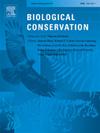Slaying the hydra of journal impact factor obsession in evaluating conservation biology research
IF 4.4
1区 环境科学与生态学
Q1 BIODIVERSITY CONSERVATION
引用次数: 0
Abstract
Since last century conservation biologists, in common with researchers and practitioners in other disciplines with a strong applied focus, have complained of poor recognition by the broader academic community of authors whose important research is published in outlets with a low Journal Impact Factor (JIF) or no JIF. Ironically, low-JIF journals are often primary sources for much applied work of narrow regional or taxonomic interest essential for successful intervention on the ground. Publications in such outlets are often rated poorly in academic review, promotion, and tenure (RPT), so how can researchers be encouraged to make these important contributions and be recognised when they do? Here, we answer by documenting evidence confirming the publication priorities of high-JIF and low-JIF conservation journals, the value of some publications in low-ranked journals for conservation policy and practice, and the harms caused by focusing on JIF in RPT. Having established the validity of concerns regarding overusing JIF in evaluating conservation research and researchers, we overview strategies available to individual researchers facing JIF-focused evaluations of their work, alternative methods for RPT for consideration by relevant committees, and opportunities for collective action to achieve reform.
打破期刊影响因子在评估保护生物学研究中的困扰
自上个世纪以来,保护生物学家与其他具有很强应用重点的学科的研究人员和实践者一样,抱怨在期刊影响因子(JIF)较低或没有JIF的期刊上发表重要研究的作者得不到更广泛的学术界的认可。具有讽刺意味的是,低jif期刊往往是许多应用工作的主要来源,这些工作对成功的实地干预至关重要,它们具有狭窄的区域或分类学兴趣。这些出版物在学术评审、晋升和终身教职(RPT)方面的评分通常很低,那么如何鼓励研究人员做出这些重要贡献,并在他们做出贡献时得到认可呢?在这里,我们通过记录证据来确定高JIF和低JIF保护期刊的出版优先级,低JIF期刊的一些出版物对保护政策和实践的价值,以及在RPT中关注JIF所造成的危害。在确定了过度使用JIF评估保护研究和研究人员的担忧的有效性之后,我们概述了个体研究人员在面临以JIF为重点的工作评估时可用的策略,RPT的替代方法供相关委员会考虑,以及集体行动实现改革的机会。
本文章由计算机程序翻译,如有差异,请以英文原文为准。
求助全文
约1分钟内获得全文
求助全文
来源期刊

Biological Conservation
环境科学-环境科学
CiteScore
10.20
自引率
3.40%
发文量
295
审稿时长
61 days
期刊介绍:
Biological Conservation is an international leading journal in the discipline of conservation biology. The journal publishes articles spanning a diverse range of fields that contribute to the biological, sociological, and economic dimensions of conservation and natural resource management. The primary aim of Biological Conservation is the publication of high-quality papers that advance the science and practice of conservation, or which demonstrate the application of conservation principles for natural resource management and policy. Therefore it will be of interest to a broad international readership.
 求助内容:
求助内容: 应助结果提醒方式:
应助结果提醒方式:


